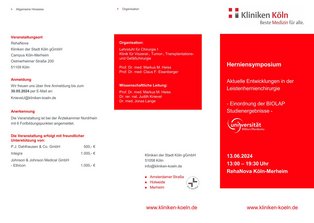Inguinal hernia surgery has evolved technically from open procedures to minimally invasive techniques and currently to robotic procedures. Hernia surgery is increasingly being performed individually, tailor-made, and adapted. Pure suture procedures now only play a subordinate role in numbers, as synthetic mesh materials have become the gold standard.
The idea of “tissue remodelling”, i.e. the induced replacement of tissue with resorbable biomaterials, was linked to the hypothesis that the advantages of tension-free mesh implants can be maintained without needing foreign material to remain in the body.
Against this background, the BIOLAP study was developed as an RCT, financed by the DFG and has since been successfully carried out and completed on around 500 patients with 1000 inguinal hernias.
In the first part of the symposium, the current status of inguinal hernia surgery and the use of absorbable mesh materials in hernia surgery will be presented and discussed.
In the second part, the results of the BIOLAP study will be presented and discussed in a clinical context.
Registration is required.
